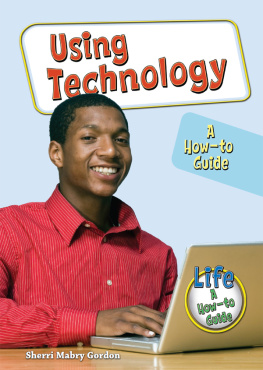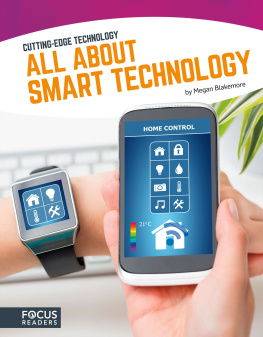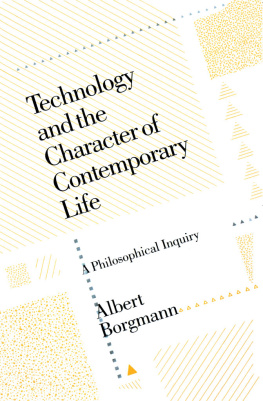Aydin - Extimate Technology
Here you can read online Aydin - Extimate Technology full text of the book (entire story) in english for free. Download pdf and epub, get meaning, cover and reviews about this ebook. year: 2021, publisher: Taylor and Francis, genre: Religion. Description of the work, (preface) as well as reviews are available. Best literature library LitArk.com created for fans of good reading and offers a wide selection of genres:
Romance novel
Science fiction
Adventure
Detective
Science
History
Home and family
Prose
Art
Politics
Computer
Non-fiction
Religion
Business
Children
Humor
Choose a favorite category and find really read worthwhile books. Enjoy immersion in the world of imagination, feel the emotions of the characters or learn something new for yourself, make an fascinating discovery.

Extimate Technology: summary, description and annotation
We offer to read an annotation, description, summary or preface (depends on what the author of the book "Extimate Technology" wrote himself). If you haven't found the necessary information about the book — write in the comments, we will try to find it.
Extimate Technology — read online for free the complete book (whole text) full work
Below is the text of the book, divided by pages. System saving the place of the last page read, allows you to conveniently read the book "Extimate Technology" online for free, without having to search again every time where you left off. Put a bookmark, and you can go to the page where you finished reading at any time.
Font size:
Interval:
Bookmark:
This book investigates how we should form ourselves in a world saturated with technologies that are profoundly intruding in the very fabric of our selfhood.
New and emerging technologies, such as smart technological environments, imaging technologies and smart drugs, are increasingly shaping who and what we are and influencing who we ought to be. How should we adequately understand, evaluate and appreciate this development? Tackling this question requires going beyond the persistent and stubborn inside-outside dualism and recognizing that what we consider our inside self is to a great extent shaped by our outside world. Inspired by various philosophers especially Nietzsche, Peirce and Lacan this book shows how the values, goals and ideals that humans encounter in their environments not only shape their identities but also can enable them to critically relate to their present state. The author argues against understanding technological self-formation in terms of making ourselves better, stronger and smarter. Rather, we should conceive it in terms of technological sublimation, which redefines the very notion of human enhancement. In this respect the author introduces an alternative, more suitable theory, namely Technological Sublimation Theory (TST).
Extimate Technology will be of interest to scholars and advanced students working in philosophy of technology, philosophy of the self, phenomenology, pragmatism and history of philosophy.
Ciano Aydin is Full Professor of Philosophy of Technology, Head of the Department of Philosophy and Vice-Dean of the Faculty of Behavioural, Management and Social Sciences (BMS) at the University of Twente, The Netherlands. He has published in Transactions of the Charles S. Peirce Society, Phenomenology and the Cognitive Sciences, Journal of Medicine and Philosophy, Philosophy and Technology, and other journals. See www.cianoaydin.nl for more information about his current research.
Routledge Studies in Contemporary Philosophy
Caring for Liberalism
Dependency and Liberal Political Theory
Edited by Asha Bhandary and Amy R. Baehr
Language and Phenomenology
Edited by Chad Engelland
The Philosophy and Psychology of Ambivalence
Being of Two Minds
Edited by Berit Brogaard and Dimitria Electra Gatzia
Concepts in Thought, Action, and Emotion
New Essays
Edited by Christoph Demmerling and Dirk Schrder
Towards a Philosophical Anthropology of Culture
Naturalism, Reflectivism, and Skepticism
Kevin M. Cahill
Examples and Their Role in Our Thinking
Ondej Beran
Extimate Technology
Self-Formation in a Technological World
Ciano Aydin
Modes of Truth
The Unified Approach to Truth, Modality, and Paradox
Edited by Carlo Nicolai and Johannes Stern
Practices of Reason
Fusing the Inferentialist and Scientific Image
Ladislav Kore
For more information about this series, please visit: https://www.routledge.com/Routledge-Studies-in-Contemporary-Philosophy/book-series/SE0720
Self-Formation in a Technological World
Ciano Aydin

First published 2021
by Routledge
52 Vanderbilt Avenue, New York, NY 10017
and by Routledge
2 Park Square, Milton Park, Abingdon, Oxon OX14 4RN
Routledge is an imprint of the Taylor & Francis Group, an informa business
2021 Ciano Aydin
The right of Ciano Aydin to be identified as author of this work has been asserted by him in accordance with sections 77 and 78 of the Copyright, Designs and Patents Act 1988.
Trademark notice : Product or corporate names may be trademarks or registered trademarks, and are used only for identification and explanation without intent to infringe.
Library of Congress Cataloging-in-Publication Data
A catalog record for this title has been requested
ISBN: 978-0-367-68728-1 (hbk)
ISBN: 978-1-003-13940-9 (ebk)
Typeset in Sabon
by codeMantra
To Nur, Zeno, Danil and Helena
PART I
What Is the Self?
PART II
Is Self-Formation in a Technological World Possible?
PART III
How Should We Technologically Form Ourselves?
The book incorporates reworked versions of the following texts: Aydin, Ciano. (2007). Nietzsche on Reality as Will to Power: Toward an Organization-Struggle Model. Journal of Nietzsche Studies 33: pp. 2548 (The Pennsylvania State University Press; reworked in ).
This book has a long history and originated from a seemingly simple idea that became an obsession: in Western culture and philosophy, the notes are often mistaken for the melody (after Bergson). Different forms of dualism, essentialism and reductionism, which are also reflected in our views of technology, seem to be manifestations of this misconception. This book is an attempt to uncover and disentangle this confusion and to provide a more appropriate framework for understanding how technologies shape the human self.
I am indebted to everyone who contributed to the realization of this book, if only by creating the conditions under which it could be written. Mentioning all the institutions and people who contributed directly or indirectly is impossible. I will therefore confine myself to naming a select few. Part 1 of the book can, at least partly, still be traced back to research I did during my NWO-VENI project (grant no. 27520008; 20052008), for which I am grateful to the Netherlands Organization for Scientific Research (NWO). The Delft department of philosophy and the Radboudstichting/Stichting Thomas More, I thank for supporting my chair at Delft University of Technology (20102019), which has enriched my research scope. My colleagues from the philosophy department of the University of Twente, I thank for the insightful discussions in symposia and research seminars, and especially for the spontaneous conversations in the hallway and at the coffee machine. I also thank my dean Theo Toonen for sending me home for a few weeks to finish the book. Miranda Nell, I thank for her corrections of my English. The anonymous reviewers I thank for their helpful feedback. And I am grateful to the editors from Routledge, especially Andrew Weckenmann and Allie Simmons, for their support. I dedicate this book to my wife Nur and children Zeno, Danil and Helena who have always been reminders of what cannot be ignored, relativized or postponed.
Shelter, clothing, the wheel, stone axes, furnaces, steam engines, roadways, canals, plumbing, clocks, furniture, automobiles, the telegraph, the telephone, cutlery, water taps, electric kettles, refrigerators, plains, guns, newspapers, computers, mobile phones: a relatively random list of technologies that have profoundly shaped our world. Characteristic of these technologies is that they are aimed toward the outside world. They serve as protection from the elements, enable interaction with outside objects and allow us to employ, manipulate and regulate the environment. They make it possible, directly or indirectly, to control, from an inside realm, the outside world.
This movement from inside to outside is also articulated by Ernst Kapp (1877), who can be considered the founding father of philosophy of technology. Kapp attempts to illustrate that technologies are essentially projections or exteriorizations of bodily organs in order to control and use the outside world. The movement from inside to outside is expressed by the human desire to tame and manipulate the obstinate environment. Technological objects extend the human organism by replicating or amplifying bodily and mental abilities: a hammer, for instance, is basically a strengthened version of a human fist, clothing is a duplication of the skin, telegraph cables are an extension of human nerves and railway systems are a copy of the vascular system. One hundred years later, Marshall McLuhan (1966) interprets technologies as amplifications or accelerations of functions originally performed by the unaided human organism; technologies, he claims, take over or supplement these functions. McLuhan has focused on media as extensions of the senses, particularly those of sight and sound; radio and telephone are seen as extensions of ears, while visual media, including writing and print, are understood as extensions of eyes (see also Brey 2000).
Font size:
Interval:
Bookmark:
Similar books «Extimate Technology»
Look at similar books to Extimate Technology. We have selected literature similar in name and meaning in the hope of providing readers with more options to find new, interesting, not yet read works.
Discussion, reviews of the book Extimate Technology and just readers' own opinions. Leave your comments, write what you think about the work, its meaning or the main characters. Specify what exactly you liked and what you didn't like, and why you think so.









